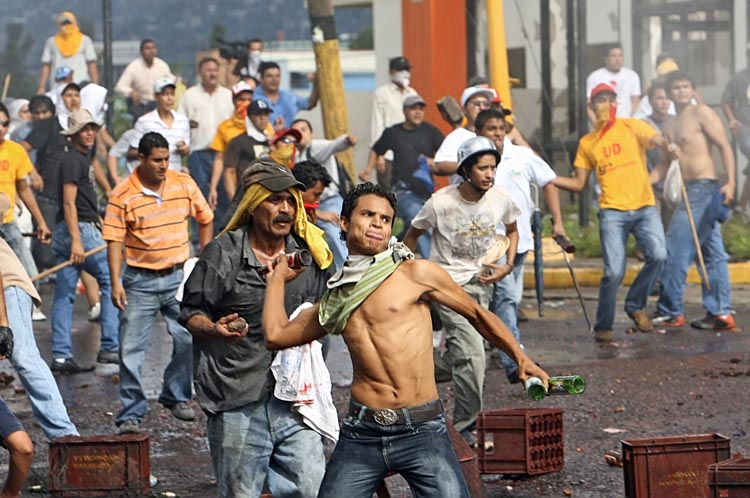It was long-rumored that Fidel Castro played a role in the effort to secure Hugo Chavez’ release from jail where he was held captive after the theatrical coup stage by the US-endowed opposition. Chavez was held captive for two days, the same two days that opposition leader Pedro Carmona was getting sized for the crown he hoped to wear as Venezuela’s next president. But, as soon as Chavez supporters heard that he had not resigned, they raced to Miraflores and scared the bejeebers out of Carmona, his white cabinet and all those blonde women who only moments before were wandering around the palace sipping champagne.
Carmona and his accomplices ran from the palace and his 48 hour “government” was over. By then close to a million Chavez supporters were thronging at the palace gates, and all that was needed was for Chavez to alight from a helicopter and the Bolivarian revoution could proceed. But, before that could happen, Fidel had to intercede to get his release.
But the nagging question has always been “what happened to Chavez during those two days?” Fidel provides the answers.
From ZNet
http://www.zmag.org/content/showarticle.cfm?SectionID=40&ItemID=10136
Fidel Ordered Chavez “Rescue”
“They attempted to execute Chavez but the firing squad refused to shoot.”
By Fidel Castro and Ignacio Ramonet – April 22, 2006
In the book “Fidel Castro, a two-voiced biography,” published by the Debate Publishing House, the Cuban president told Ignacio Ramonet information not previously released about the events of April 2002 in Venezuela.
Castro states that he phoned Miraflores Palace before Chávez surrendered and told him: “Don’t kill yourself, Hugo. Don’t do like Allende, who was a man alone. You have most of the Army on your side. Don’t quit, don’t resign.”
Later, Fidel directed Cuban Foreign Minister Felipe Pérez Roque, to fly to Caracas in one of two planes to pick up Chávez and fly him to safety.
Castro contacted “a general who sided with [Chávez]” to tell him that the world knew the president had not resigned and to ask the general to send troops to rescue the president.
Fidel Castro, who delivers so many speeches, has granted very few interviews. Only four long conversations with him have been published in the past 50 years. The fifth such interview, with the editor of Le Monde Diplomatique, Ignacio Ramonet, has become the book “Fidel Castro, a two-voiced biography,” a summary of the life and thoughts of the Cuban chief of state, distilled from 100 hours of conversation. The first interview was held in late January 2003; the final one, in December 2005.
Published in these pages is an excerpt from the interview in which Castro talks about the Venezuelan conflict that occurred on April 11, 2002. As the Comandante says, he will remain in office “as long as the National Assembly, in the name of the Cuba people, wishes.” The book, soon to appear, is published by the Debate Publishing House. Continue reading “Venezuela’s 2002 Coup: How Fidel Saved Chavez and the Bolivarian Revolution” →


